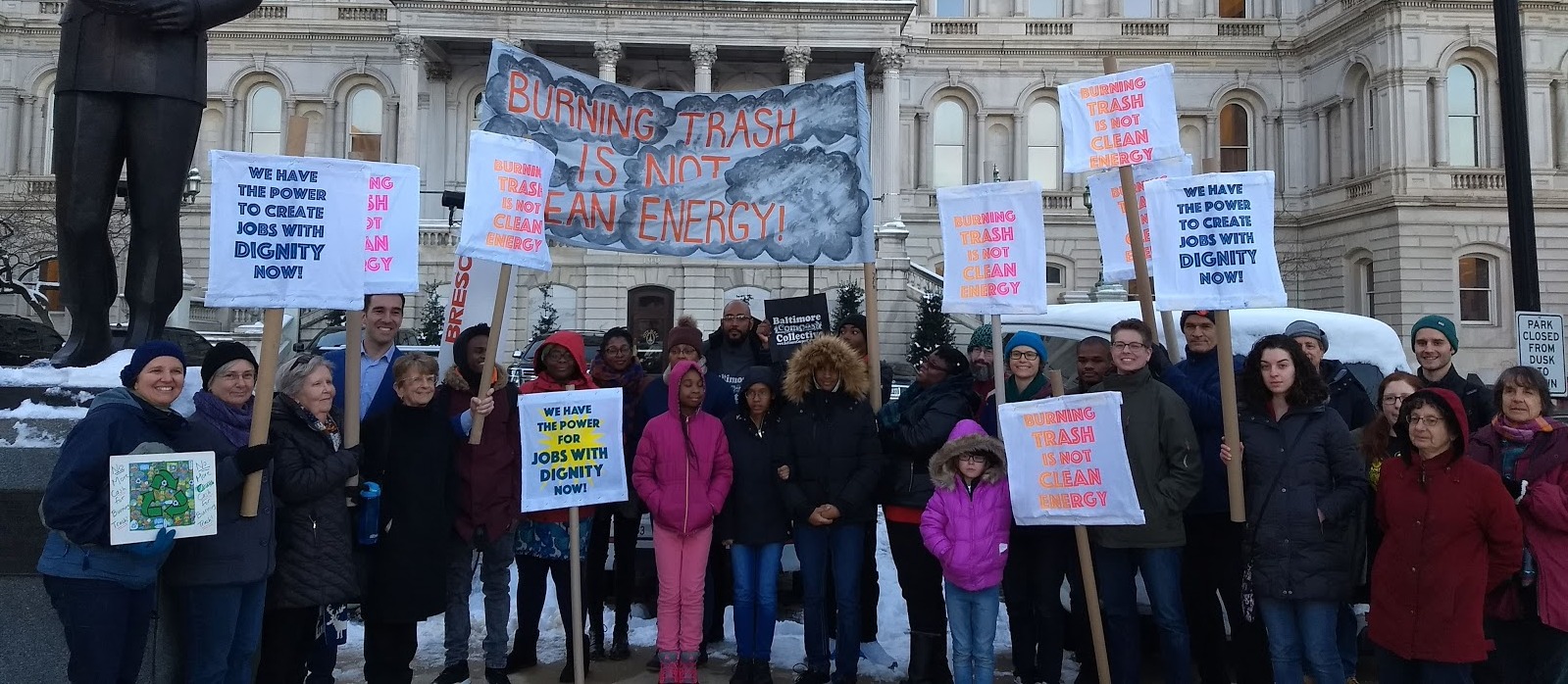
Report highlights the need to clean up Maryland’s Renewable Portfolio Standard, through passage of the Reclaim Renewable Energy Act (HB11)
A new report released this week by PEER finds that Maryland “renewable energy” subsidies are going towards polluting energy sources, threatening public health and undermining climate goals at the public’s expense. Maryland’s Renewable Portfolio Standard (RPS) was created by the state legislature in 2004 as a way to ramp up the supply of renewable electricity on our grid, and reduce the use of polluting fossil fuels. However, Maryland allows polluting, carbon-intensive fuel sources like trash incineration and factory farm biogas to qualify for subsidies and credits under the RPS program, undermining the very purpose of the standard. Key report findings include:
-
In 2020, greenhouse-gas-emitting energy sources made up nearly 35% of Maryland’s “clean energy” under the state’s Tier 1 Renewable Portfolio Standard. The General Assembly removed black liquor - a polluting paper mill byproduct - from the RPS in 2021. But even excluding black liquor, polluting energy sources that now remain in the RPS made up nearly a quarter of the RPS in 2020.
-
Over the past eight years, Maryland ratepayers have seen a 43 percent increase in energy costs. Amidst those rising costs, Maryland “clean energy” money going to polluters is a wasted opportunity and a waste of ratepayers’ money.
-
If Maryland does not clean up its RPS, state ratepayers will have spent about a half-billion dollars subsidizing polluting energy between 2008 and 2030.
-
Credits from polluting energy sources are largely purchased from out of state. Some of the facilities where Maryland ratepayer dollars go are considered too dirty to qualify for subsidies in their home states. For example, between 2014 and 2020, Maryland ratepayers gave $26 million in subsidies to a Virginia biomass facility - a source Virginia considers too dirty to qualify for its own recently-enacted RPS
Delegate Vaughn Stewart (D-Montgomery)’s legislation, HB 11, the Reclaim Renewable Energy Act, proposes to eliminate polluting energy sources from the RPS. As the climate crisis becomes more acute and accessibility to renewable energy becomes increasingly important, the Reclaim Renewable Energy Coalition - comprised of over 20 organizations - demand passage of HB 11 to ensure every dollar of ratepayers’ renewable energy money supports the development of clean energy sources, like wind, solar, and geothermal.
“These giveaways are great for corporate polluters, but terrible for working families in Maryland,” said Delegate Vaughn Stewart (D-Montgomery). “Handouts for dirty energy means fewer clean energy jobs and higher utility bills. It’s way past time to turn off the pollution spigot.”
“Maryland ratepayers should not be responsible for the failing finances of yesteryear’s dirty energy sources,” said Lily Hawkins, Maryland Organizer with Food & Water Watch. “Maryland needs to clean up its act and remove polluting energy sources from our state’s renewable portfolio standard. Clean energy money should only go towards truly clean energy — not industry’s false solutions. The Maryland state legislature must pass HB 11 with haste, and ensure no more ratepayer dollars fund out-of-state dirty operations at our expense.”
"Factory farm gas, or so-called biogas, has no place in Maryland's Clean Energy Plan. It's not clean. It's not green — and it's not a solution,” said Maria Payan, Senior Regional Representative with the Socially Responsible Agriculture Project. “To improve our state's renewable portfolio standard and ensure our communities are resilient against climate change, we must adopt clean energy solutions that effectively address the climate crisis."
“Here in Baltimore, we suffer the consequences of a wasteful state renewable energy policy that has more to do with increasing corporate profits than with science, people's health, or our environment,” said Shashawnda Campbell with South Baltimore Community Land Trust. “Burning trash that is filled with fossil fuel based plastics is as far from renewable energy as you can get and yet Maryland officials continue to choose to give away millions of our public subsidy dollars that are needed to fund community and worker led solutions to come back from a global pandemic. A new compost and resource recovery park in Baltimore could divert the hundreds of tons of food scraps and other materials that the city's worst air polluter, the BRESCO incinerator, burns every day and that are dumped in the state's second worst methane emitter, the Quarantine Road Landfill. Composting, recycling and re-use businesses create 10-20 times more jobs than incineration and landfilling. Now is the time to align our public resources with our values and with the needs of our communities, workers and our planet.”
"Community leaders in Frederick County, Carroll County, and Baltimore City had to fight for almost a decade to prevent new trash incinerators from being built - incinerators that were falsely greenwashed as environmental solutions and would have received "renewable energy" subsidies through the RPS. And now, communities on the Eastern Shore are facing the same fight against new factory farm biogas," said Jennifer Kunze, Maryland Coordinator at Clean Water Action. "Maryland needs to double down on real renewables, not force ratepayers to subsidize the very polluting facilities we’re trying to fight."
"Young people are facing an existential threat. The climate crisis is here, and it is way past time our elected leaders stepped up to take serious action. Maryland is the richest state in the richest country in the world and is responsible for leading the transition to a renewable energy economy. That’s not going to happen as long as Maryland continues funding dirty sources like trash incineration and factory farm biogas with renewable energy subsidies - that’s greenwashing! Let’s get serious,” said Stephen Leas of Sunrise Baltimore. “We’re reclaiming renewable energy for Maryland while we still have time. We call on Maryland voters and the Maryland General Assembly to join us in fighting the climate crisis and building the real renewable energy economy we deserve. Let’s go!”